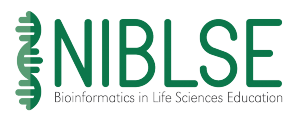Incubators: A community based model for improving the usability of bioinformatics learning resources
Author(s): Hayley Orndorf1, Bill Morgan2, Neal Grandgenett3, Mark A. Pauley3, Elizabeth Ryder4, Michael Sierk5, Robin Wright6, Anne Rosenwald7, Liz Dinsdale8, Eric Triplett9, Sam S Donovan1
1. University of Pittsburgh 2. The College of Wooster 3. University of Nebraska at Omaha 4. Worcester Polytechnic Institute 5. Saint Vincent College 6. University of Minnesota 7. Georgetown University 8. San Diego State University 9. University of Florida
1601 total view(s), 221 download(s)
NABT_NIBLSE_poster_hco.pdf(PDF | 513 KB)
- License terms
Description
Presented at the Great Lakes Bioinformatics Conference, Chicago, IL, May 2017
There are a variety of barriers to faculty participation in scholarly approaches to teaching. Primary among these are the challenges undergraduate faculty face in finding and participating in a scholarly community, and in receiving academic credit for their work. The Open Education Resources (OER) movement was designed in part to make it easier for faculty to share their work, particularly in the context of adopting and adapting existing resources. However, participation in the OER community by undergraduate biology faculty is hampered by a lack of awareness, lack of an active disciplinary community, and technical difficulties involved in sharing modified materials. Furthermore, recognition for this type of teaching scholarship is undermined by the lack of clear and consistent ways to document participants' intellectual contributions. We have designed a system for facilitating collaborative projects around existing learning resources that both improve the quality of the materials and also document participant contributions. Incubators are small, peer-driven, relatively short-lived, online communities that work with a learning resource to 1) move it toward publication, 2) improve its usability, and 3) provide customizations for different student audiences and teaching settings. Incubators are formed around specifically identified goals in one or more of these areas. Incubator participants work in an online environment with both editorial and technical facilitators to produce materials that will be shared publicly, with the ultimate goal of publication in an open-access journal. This work is a collaboration between the NSF- funded Network for Integrating Bioinformatics into Life Sciences Education (NIBLSE) and the Quantitative Undergraduate Biology Education & Synthesis (QUBES) projects. The NIBLSE community brings both bioinformatics teaching expertise and learning resources to the Incubators. The QUBES community provides online infrastructure and experience in facilitating online collaboration and publication. Please visit https://qubeshub.org/groups/niblse/resourcecollection for more information.
Cite this work
Researchers should cite this work as follows:
- Orndorf, H., Morgan, B., Grandgenett, N., Pauley, M. A., Ryder, E. F., Sierk, M., Wright, R., Rosenwald, A., Dinsdale, L., Triplett, E., Donovan, S. S. (2018). Incubators: A community based model for improving the usability of bioinformatics learning resources. Network for Integrating Bioinformatics into Life Sciences Education, QUBES Educational Resources. doi:10.25334/Q4KQ30
